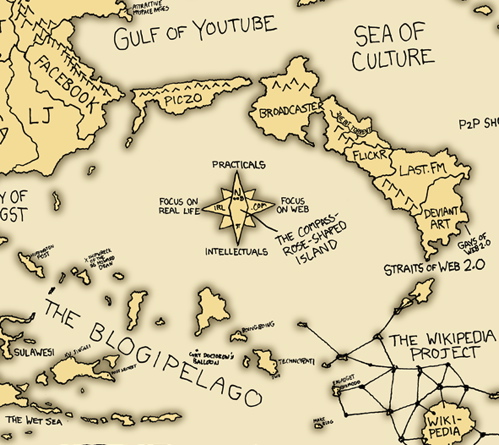May 22
Mapping Knowledge Management
I like maps. I bought this book on maps. Inside, I found the map below – unattributed, and probably from the turn of the nineteenth/twentieth century.
It describes for me – almost perfectly – the early 21st century KM scene, and those of you who have been observing the actKM and AOK Forum discussions over the past few months may find some striking resonances.
I especially like the “Hotel Know It All” and “Mutual Admiration Society” down at the bottom right, and the railway going in circles next to the cauldron of Misrepresentation almost half way down on the left. Oh, and just before you get to the Gate of Ideals, the spring loaded platform called “sprees” flinging the unfortunate traveller high into the air. How little we change over time. The devil is in the detail, so click on the thumbnail below to download the full version (it’s 1.1MB).
By the way. For the avoidance of any doubt, there is no “perfect system railway” in KM. We’d like to believe there is. But there isn’t, and so we do have to run the gauntlet of all the distractions, terrors and deviations in the map below.
May 22
Of Divas and Unconferences
 Patti Anklam has posted some nice ideas on what an unconference on KM might look like, and notes the conections to Open Space Technology (the agenda emerges from the participants).
Patti Anklam has posted some nice ideas on what an unconference on KM might look like, and notes the conections to Open Space Technology (the agenda emerges from the participants).
A week later Dave Snowden issued a spoiler by suggesting that unconference enthusiasts (uncharacteristically not naming names) might be failed diva wannabes from the mainstream conference circuit. He doesn’t link to Patti, so it might just be a coincidence.
But it’s interesting that he picks up on the personality cult angle – and there’s a hint in his post that if you wannabe a diva admit it, don’t hide behind the mantle of guru-facilitator orchestrating the emergent knowledge of a crowd.
Dave is probably right, at least to a degree – his observations are often uncomfortably astute, and it does take a diva to sniff other divas out. But his focus on closet-divas distracts from the other merits of unconferencing and similar participatory approaches. I’ve argued elsewhere that the mainstream commercial conference “listen to me, I’m a diva” approach is more suited to less mature audiences, and that as KM professionals mature in their practice, they look for more participatory mechanisms for learning and sharing.
This suggests to me that such conferences have more defence mechanisms than the serried rows of a keynote audience against diva-behaviours, even closet ones – they give permission to walk away and join another discussion. And more mature audiences do just that.
For more on conferences and unconferences in Green Chameleon click here.
May 17
RSS Tutorial
David Gurteen has a really nice straightforward article on what RSS is and how to use it. He’s included some good examples, lots of links to other resources, including a video tutorial.
May 10
Wisdom - The Question for Every 64-Year Old
Wisdom = Cognitive Processing + Emotion Management!
In the Straits Times Review Section of May 8, 2007 (two days ago), there was a piece on defining wisdom or at least a sub-heading on it. It is written by Stephen Hall, author of ”Size Matters: How Height Affects the Health, Happiness and Success of Boys - And the Men They Become“. Back to the piece, it starts off saying that wisdom does not come with age (although I felt most of the write-up seems to allude to it).
OK, here are some bites from it - but before that...don’t shoot the messenger!
May 10
Paradise 2.0?
 It seems that the heavenly powers are also getting into Web 2.0. Jesus, for example, has had a Myspace page since October 2004, I am pleased to discover – he’s obviously a very busy fellow because he’s only managed to rack up 17,000 or so friends. I would have expected more, somehow.
It seems that the heavenly powers are also getting into Web 2.0. Jesus, for example, has had a Myspace page since October 2004, I am pleased to discover – he’s obviously a very busy fellow because he’s only managed to rack up 17,000 or so friends. I would have expected more, somehow.
He’s not so hot on videos, perhaps more respectful of copyright than the younger crowd, but he is blogging intermittently, and in much the vein that you might expect. He’s also actively seeking to extend his network, apparently.
May 10
Planning vs Co-Evolution in Knowledge Management
It’s my day for thanking Clive for some interesting links. This post from Dave Pollard summarised in his diagram (below) looks like a really good way to get started with using Web 2.0 technologies to improve collaboration in the enterprise. His suggestion is to let a strategy emerge: start with some simple ideas and easy-to-do experiments, resource the ones that work, and drop the ones that don’t (the best of all strategies in a complex, shifting domain).
In Dave’s words: “You have to let a full understanding of the organization’s problems and needs, and the solutions that address those needs, co-evolve.”
I sometimes wish that organisations would be more open to such co-evolution approaches in broader KM strategy buiding as well. Too often, we find people prefer a more defined planning approach that gives them a great sense of security and direction for the longer term. They want to do a “one shot” strategy that defines a complete programme of activity five years into the future, for example. But when we build that with them, they often find it’s intimidating and very complicated to handle, because we’re trying to cover too many bases and uncertainties looking that far into the future. Big plans often do not survive the hurly burly of change, especially changes in organisation leadership or KM programme teams.
May 10
Representing Communities on the Web
This from Clive Flashman: a delightful map of online communities on the web by web comic artist Randall Monroe. The countries are scaled by approximate membership, which means that this geography will be a rapidly changing one – I wonder is the geographic metaphor a good one in this particular instance? What the heck, art trumps reason if it entertains!
What I especially liked was the small detail of the compass rose shown in the close-up below, suggesting four main focal areas for web communities: real life, practicals, focus on the web (navel gazing?) and intellectual matters. The “intellectual” direction of the compass points directly at the “Blogipelago” – which I’m sure will cheer everybody up. Go see the full version and enjoy.
If you enjoy map-like representations, you might also like this.

May 04
Lost in Translation

I’m in Kuwait right now for a workshop with a client. On my way to the venue the other day I was chatting with my driver. We got to comparing notes about what happens when you live in another country for too long. He’s from Pakistan, and has been here for 30 years, I am from the UK and have lived in Singapore for 16 years.
He told me he goes back every year, but he could never live there again. Too much has changed, there is no easy way back in culturally or economically, and it’s too easy to get by and make a decent living in his now-home, Kuwait. He feels like a foreigner in his native land.
May 01
Successful KM is Not Always What it Seems
Fellow Singaporean KMer Alton Chua had a great article in the Wall Street Journal a couple of days ago. To quote:
“In the effort to improve corporate performance by sharing key knowledge among employees across an organization—a practice known as knowledge management—glowing reports of success far outnumber tales of disappointment. But this picture isn’t quite as rosy as many people believe.
That’s because there are many projects that initially are labeled a success—and it’s only later that negative consequences appear. Some companies, for instance, have found their knowledge-management projects result in an overreliance on a database for problem solving. Others have tried, unsuccessfully, to replicate the same knowledge-management system across different departments. Others have discovered that the original team of contributors in a project ends up squeezing out any knowledge from outside the core group.”
Alton takes a look at three different cases where apparent success either didn’t transfer well or resulted in long term harm to knowledge use. Thanks to the Netdimensions email newsletter for this reference.
Apr 19
Serendipity, Inversion, Idiosyncratic Categories and Junk: Tools for KM?

Yesterday was a day for serendipity. First Kim Sbarcea pointed me to Uncyclopedia - a delightfully witty wiki for “un-knowledge”. I have a book of the same name by Gideon Haigh, which is a bizarre miscellany of fascinating facts you might throw into a dinner conversation when silences get too deep or learn religiously to prepare for a game of trivial pursuits (like the nomenclature of names for the sails of a three masted schooner, or the burial places of rock stars). Reading it is a completely serendipitous experience, you have no idea what you’re going to get on the next page.
But the Uncyclopedia website is more like anti-knowledge than miscellany of trivia. It’s a tongue-in-cheek parody of Wikipedia, and in its own way inverts everything we say we believe about knowledge and knowledge management. Here’s a snip from the entry on knowledge which, like a great deal of wit, contains deep truth in the inversion of socially accepted norms:

